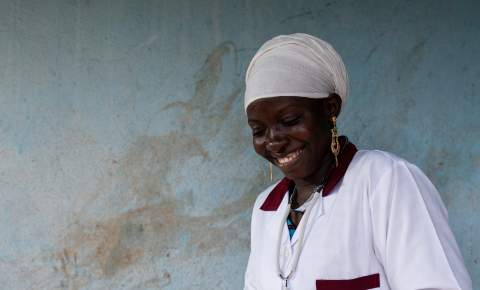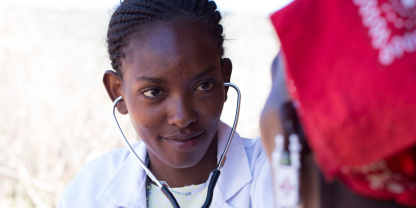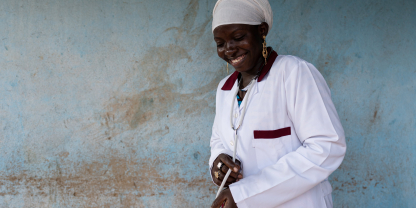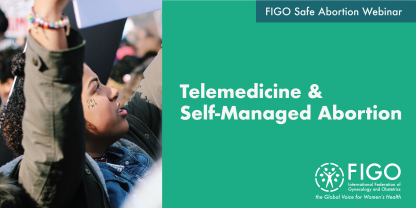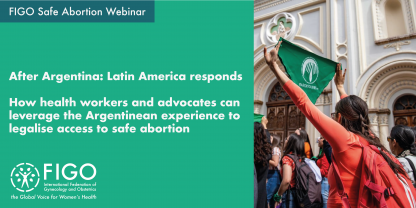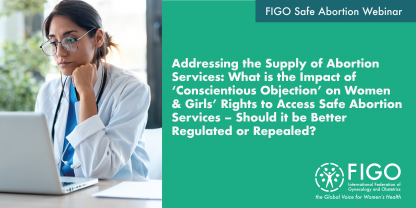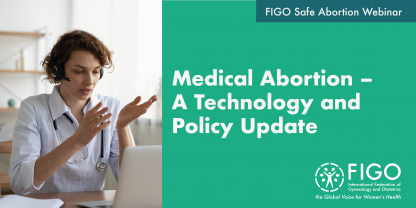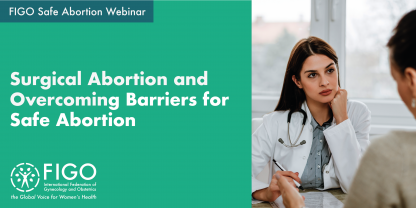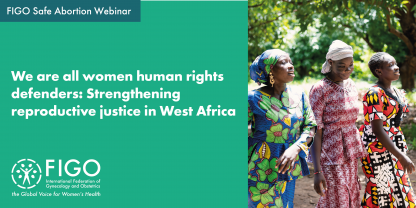Advocating for Safe Abortion Project
FIGO’s Advocating for Safe Abortion Project supports national member societies with their work on improving access to safe and quality abortion care and to reach their potential as leaders in sexual and reproductive health and rights (SRHR) in their respective countries.
Project contact
To contact the project team to ask a question about their work or to seek opportunities for collaboration, please click below.
Jema Davis, Project Manager, West Africa
Jessica Morris, Head of Programmes Development
The importance of safe abortion
FIGO regards reproductive choice, including access to safe and quality abortion care, as a basic and non-negotiable tool for ensuring the human rights of everyone, globally.
Legal restrictions on abortion do not reduce the number of abortions but increase the number of abortions that are unsafe. In addition to legal restrictions, regulatory requirements such as approvals and mandated waiting times, stigma, economic factors, and service delivery factors such a lack of providers due to refusals and/or long distance to facilities also act as barriers to access which may result in women/girls turning to unsafe measures.
Lack of access to safe abortion due to these barriers results in 45% of all abortions globally being unsafe. Unsafe abortion remains a catastrophic public health problem accounting for up to 13% of preventable maternal mortality worldwide (nearly 39,000 preventable maternal deaths a year), with hundreds of thousands of survivors living with preventable long-term complications, including infertility and chronic pain.
Lack of access to abortion care disproportionately impacts those living in poverty; people with marginalised racial or ethnic identities, adolescents and people living in rural areas, further exacerbating their historical discrimination and mistreatment, and placing them at the greatest risk of preventable maternal death and disability.
What we do
National societies of Obstetrics and Gynaecology are in a unique position to be SRHR advocates due to their technical expertise, frontline health care insights and close relationships with other partners including the Ministry of Health.
Running since 2019, the Advocating for Safe Abortion Project supports societies to position themselves as national, regional and global leaders in evidence-based safe abortion advocacy.
Currently, the project works with the following national member societies:
- Society of Gynecologists and Obstetricians of Cameroon (SOGOC)
- Societé Malienne de Gynécologie Obstétrique (SOMAGO)
- Societé de Gynécologues et Obstétriciens du Burkina (SOGOB)
With the support of the project, these societies aim to amplify their evidence and critical insights, to inform and influence international advocacy policy making and nurture accountability of governments on the delivery of the SRHR obligations.
FIGO has also recently implemented the Self Management of Abortion project with ZAGO in Zambia.
FIGO also works two African regional partners on the ASA project: East, Central and Southern Africa College of Obstetrics and Gynecology (ECSACOG) and the Société Africaine de Gynécologie et d'Obstétrique (SAGO).
The Project team works closely with the FIGO Committee on Safe Abortion on communications and advocacy campaigns, statements, training and implementation of WHO best-practice guidelines. We also work with a broad array of international partners on this project.
Project pillars:
The project aims to deliver change through two pillars:
Pillar 1: Institutional Strengthening
Support societies to strengthen organisational structures to deliver their objective effectively, areas include: office management and human resources, governance and leadership, project and financial management, advocacy and communications, and partnerships and influencing.
- Leverage member societies’ position and expertise to be a national leader on SRHR.
Pillar 2: Safe Abortion Advocacy
- Harness the pivotal role of the society to engage with their government and deliver on advocacy objectives as part of national SRHR networks.
- Work with healthcare providers to enable them by increasing their knowledge of the issues linked to safe abortion care and deepen their understanding of legal (national and international) obligations and standards to deliver safe and quality abortion care
- Address stigma related to abortion among health care workers and decision-makers using the 'Values, Clarification and Attitude' tools and through dissemination and interaction with scientific-based evidence.
Previous project societies
Since it started in 2019, and in addition to the current three project societies listed above, the project has worked with the following national member societies:
West Africa:
- National College of Gynecologists and Obstetricians of Benin (CNGOB)
- Societe de Gynecologie et d’Obstetrique de Cote d’Ivoire (SOGOCI)
East, Central, Southern Africa:
- Kenya Obstetrical and Gynaecological Society (KOGS)
- Associação Moçambicana de Obstetras e Ginecologistas (AMOG)
- Association of Obstetricians and Gynaecologists of Uganda (AOGU)
- Zambia Association of Gynaecologists & Obstetricians (ZAGO)
- Rwanda Society of Obstetricians and Gynecologists (RSOG)
Latin America:
- Sociedad Panamenã de Obstetricia y Ginecología (SPOG)
- Sociedad Peruana de Obstetricia y Ginecología (SPOG)
Find out more by reading through the project's Theory of Change.
FIGO’s Advocating for Safe Abortion long-term project impact is to remove barriers and challenges faced by pregnant people seeking access to safe and quality abortion care, and to support and enable health care workers to effectively carry out their responsibilities to provide sexual, reproductive health care and rights.
In 2022, at the end of 3 years of project implementation, an evaluation of the project was carried out by KIT Royal Tropical Institute. They assessed the project at the level of each national member society and also produced a synthesis report of the project across all 10 countries. The reports are available below:
Evaluation Executive Summary: English – Français – Español
Evaluation Synthesis Report: English – Français – Español
Regional and International engagements
Campaigns
In 2023, the FIGO Advocating for Safe abortion Project launched the #IAmSAFE campaign supporting safe abortion care in Africa. The campaign was spearheaded by five member societies from Benin, Cote d’Ivoire, Mali, Cameroon, and Burkina Faso. The campaign provided relevant tools and messaging to activists, journalists, artists, OBGYNs and civil society groups for them to better engage and involve decision-makers on this essential health care issue.
On 5 April 2022, FIGO joined the International Planned Parenthood Federation (IPPF), the International Confederation of Midwives (ICM), IPAS Partners for Reproductive Justice (IPAS), and MSI Reproductive Choices (MSI) in the launch of a joint initiative “Defending the Frontline Defenders of Sexual and Reproductive Health and Rights”. The aim of the campaign was to advocate for and strengthen the protection of frontline SRH workers and advocates, to ensure that they are able to carry out their work without stigma, fear, threat or intimidation.
FIGO has published statements providing guidance to doctors and member societies on abortion topics, notably calling for decriminalization, providing evidence to UN bodies, and working with partner organization to advocate for increased access to medical abortion and self-managed abortion.
FIGO raises its voice to defend rights when they are challenged in the legal system though involvement in strategic litigation efforts. Some examples of these are from Europe, USA and Latin America, with related evidence being used to good effect.
